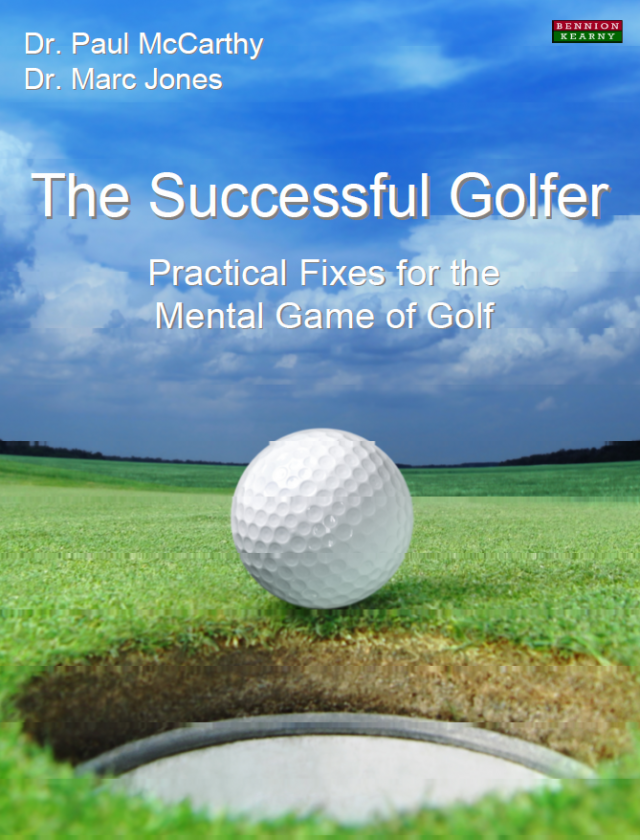
The Successful Golfer: Practical Fixes for the Mental Game of Golf

> Sharpen up your golf; address common faults that hold you back
> Full of fascinating research and studies
> Written by experienced Golf Sport Psychologists, Dr. Paul McCarthy and Professor Marc Jones
Golf Psychology
You do not have to play many rounds of golf to understand how much of the game is played in the mind. Different courses, conditions, and shot requirements all present unique challenges that need focus and mental strength from the winning player. In turn, moving from the practice range onto the golf course can often magically produce drops in concentration, increased frustration, and unexpected self-doubt: drives go wayward, three foot putts get missed, and water features seem to become magnets.
The Successful Golfer is designed to help address 50 of the most common faults that players experience and which hold them back. These include: hitting the self-destruct button when winning, nervousness on the first tee, lost confidence, failing to practise as you play, losing focus off poor drives, and many more. Each fault is remedied with a clear practical fix. You will learn to develop effective practice plans, build a dependable pre-shot routine, cope with the pressures of competitive golf, and deal with distractions.
In the second part of the book, lessons from 30 fascinating research studies on golf are presented to help keep you ahead of the field. They include research on putting, practice, choking, and overthinking. In the third and final part of the book, clear instructions are provided on developing a number of highly effective techniques that can be used across a wide variety of situations. These include: pre-shot routines, breathing exercises, goal setting, and how best to practice.
Written by experienced Sport Psychologists, Dr. Paul McCarthy and Dr. Marc Jones, The Successful Golfer is a must-read addition to any golf psychology bookshelf. Read it and fix those mental faults that stop you from playing your best golf!
Just some of what you will learn:
> Learn to play consistently on the golf course and win when it matters most
> Develop unshakeable confidence in all facets of your game
> Build a consistent pre-shot routine to concentrate effectively and manage distractions
> Boost your resilience and learn to cope with the demands of competitive golf
> Uncover the golf psychology secrets of success from the world’s best golfers
Who this Book is for. This book is for both amateur and professional golfers seeking to conquer the mental side to the game of golf. All ages and levels of experience will benefit from the knowledge and advice contained within.
Review:
As a mental trainer, former LPGA Tour player and writer… I was impressed with the depth of knowledge and the author’s sense of really knowing what is going through the golfer’s mind. This is a read I would have loved to have in my arsenal during my tour days. It is my belief that you will gain a better understanding of yourself as a golfer and then some! This is a book every golfer in this world should have on their night stand, office and reading room. Bunker’s Paradise
Table of contents
Part 1
Introduction
The Differences Among Golfers
The Old Course
On the Range at the Old Course
The New Course
On the Range at the New Course
How Should You Use This book?
Fault 1: I never seem to be able to play as well on the course as I do on the range
Fault 2: Sometimes on the range, I cannot seem to hit a thing and, at other times, it just flows perfectly
Fault 3: I hit hundreds of balls on the range but never seem to get much better
Fault 4: I slip into bad practice habits on the range
Fault 5: I am slow to get going when I play on the course
Fault 6: I feel so nervous on the first tee and often hit a poor shot
Fault 7: When I have a scorecard in my hand, I go to pieces
Fault 8: When I have a three-foot putt, I often miss them but I think I should score easily
Fault 9: I often end up short of the green when I know I should hit the green
Fault 10: I feel my body getting twitchy when I have to play a short wedge to the green
Fault 11: If I have a poor drive, it ruins my score on the hole and the game
Fault 12: I often end up three-putting when I have a great chance of a birdie
Fault 13: Whenever I try not to think about hitting the ball in the water, that’s exactly where it goes
Fault 14: Even the slightest noise interrupts my concentration
Fault 15: I can’t seem to relax the night before a big tournament
Fault 16: I feel so nervous on the morning of a tournament and I don’t know what to do
Fault 17: I give myself a really hard time if I don’t hit a perfect shot every time
Fault 18: I lose motivation to train if I don’t do well in a game at the weekend
Fault 19: I can’t seem to control my emotions when I get angry
Fault 20: My game falls apart when I am in contention to win
Fault 21: I never seem to live up to my expectations
Fault 22: I can’t seem to concentrate when I have made a mistake
Fault 23: I can’t putt well when I am nervous
Fault 24: When I putt, I always seem to leave the ball short of the hole
Fault 25: I have lost my confidence in golf
Fault 26: I lose my confidence if I start a game badly
Fault 27: I lose confidence in parts of my game
Fault 28: I can’t seem to play well for the big games
Fault 29: I drift in and out of the game
Fault 30: I never play well when someone important is watching me
Fault 31: I never seem to play as good as my friend, even though I am better
Fault 32: I can’t stop thinking about playing badly before the game begins
Fault 33: I can’t seem to get mistakes out of my head
Fault 34: I never stick to my game plan during the game
Fault 35: Short putts are my Achilles heel
Fault 36: I can’t stop thinking about the score during the game
Fault 37: I can’t stop worrying about what other people think of my golf
Fault 38: I can’t cope with a negative playing partner
Fault 39: I can’t cope with distractions on the golf course
Fault 40: I am afraid I am going to make mistakes during the game
Fault 41: I feel frustrated when I don’t play to my expectations
Fault 42: I feel frustrated when I do not chip well
Fault 43: I can’t enjoy my round of golf
Fault 44: I can’t stop doubting myself on the course
Fault 45: I can’t manage my anger after a bad shot
Fault 46: When I lose my confidence I can’t seem to get it back
Fault 47: I have a great fear of three putting
Fault 48: I can’t maintain my tempo late in the round
Fault 49: I can’t trust my swing after a poor tee shot
Fault 50: Slow players frustrate me and make me play poorly
Putting the Mental Game into Action
Part 2
Research Bunker #1: Reflecting positively on performance improves motivation
Research Bunker #2: If you want to putt well don’t think about it!
Research Bunker #3: Be careful what you think!
Research Bunker #4: The psychological approach to golf does make a difference
Research Bunker #5: Imagery and self-talk can help you play better
Research Bunker #6: Top professionals think better
Research Bunker #7: Where you focus your attention is important to play well
Research Bunker #8: Sticking to a pre-shot routine will help you perform better
Research Bunker #9: On what should you concentrate to hit more accurate shots in golf?
Research Bunker #10: Stress can affect the movement of your golf swing
Research Bunker #11: Just let those worries out
Research Bunker #12: How quickly do golfers’ performances decline as they get older?
Research Bunker #13: Understanding and preventing choking
Research Bunker #14: Some friendly words can help with putting
Research Bunker #15: Skilled Golfers should focus on the flight of the ball and not on the swing movement
Research Bunker #16: Stick to a routine (that works)
Research Bunker #17: Practice to compete
Research Bunker #18: Why does Tiger Woods wear red?
Research Bunker #19: Take a conservative perspective on putting
Research Bunker #20: Varying practice helps your performance
Research Bunker #21: Social support matters on the course
Research Bunker #22: Broken clubs and expletives – how do golfers cope with stress?
Research Bunker #23: Confidence buffers the effect of anxiety on performance
Research Bunker #24: Is there such a thing as a “streaky” putter?
Research Bunker #25: Which skills will earn you the most money in golf?
Research Bunker #26: How much time should you take over your putts?
Research Bunker #27: Do good PGA professionals play better when Tiger Woods is around?
Research Bunker #28: Do you overthink your putts? And is it helping your putting?
Research Bunker #29: Are professional golfers at the Masters getting better each year?
Research Bunker #30: Should you play aggressively or conservatively for the best outcomes in golf?
Summary
Part 3
Being a confident performer
Goal setting
Say the Right Things – Self-talk
Imagining the Right Things
Imagery
Breathing Exercises
Golf Pre Shot Routine
Perfect Practice Makes Perfect
Practising for the Real Thing
Reflect on the Right Things
Further Information
Bibliography
About The Authors
Dr Paul McCarthy is the first-ever resident Sport Psychologist at the home of golf – St Andrews Links – and a Lecturer in Psychology at Glasgow Caledonian University. He has published numerous academic papers and books in sport and exercise psychology. He is a registered Sport Psychologist (HCPC) with over 15 years of experience working as a consultant in amateur and professional golf.
Prof Marc Jones is a Professor in Sport and Exercise Psychology at Manchester Metropolitan University and has published over forty academic papers mostly in the area of stress and emotion. He is a registered Sport Psychologist (HCPC) and is currently working as a consultant in professional football and golf.
Authors: Dr Paul McCarthy and Dr Marc Jones
978-1-909125-23-0 | Published: 25th July 2013 | Paperback 192 pages: $18.99, £13.99 | eBook $9.99 / £6.99
When you purchase through links on our site, we may earn an affiliate commission at no addditional cost to you.
Book Categories: Golf and Sport Psychology.


